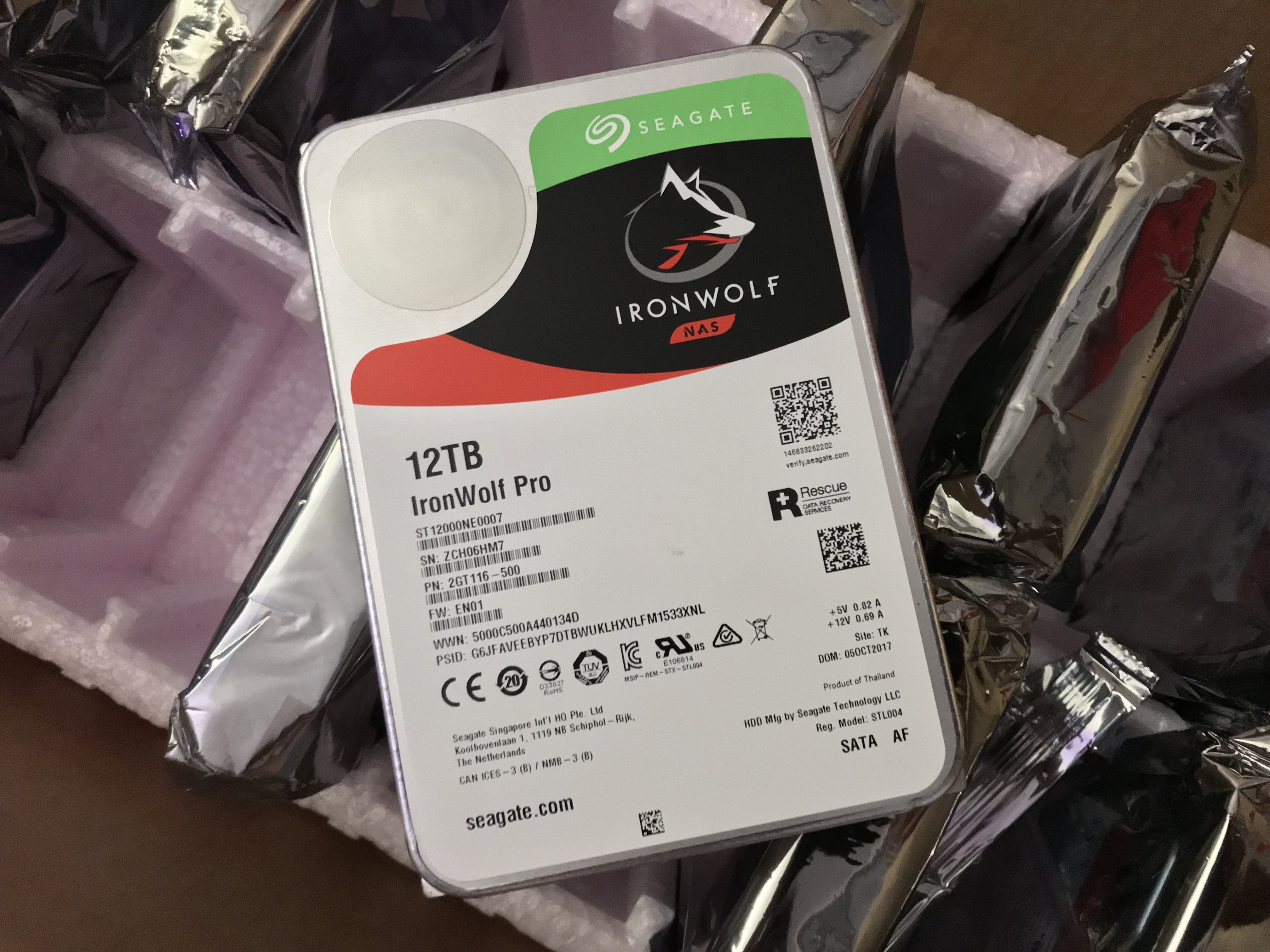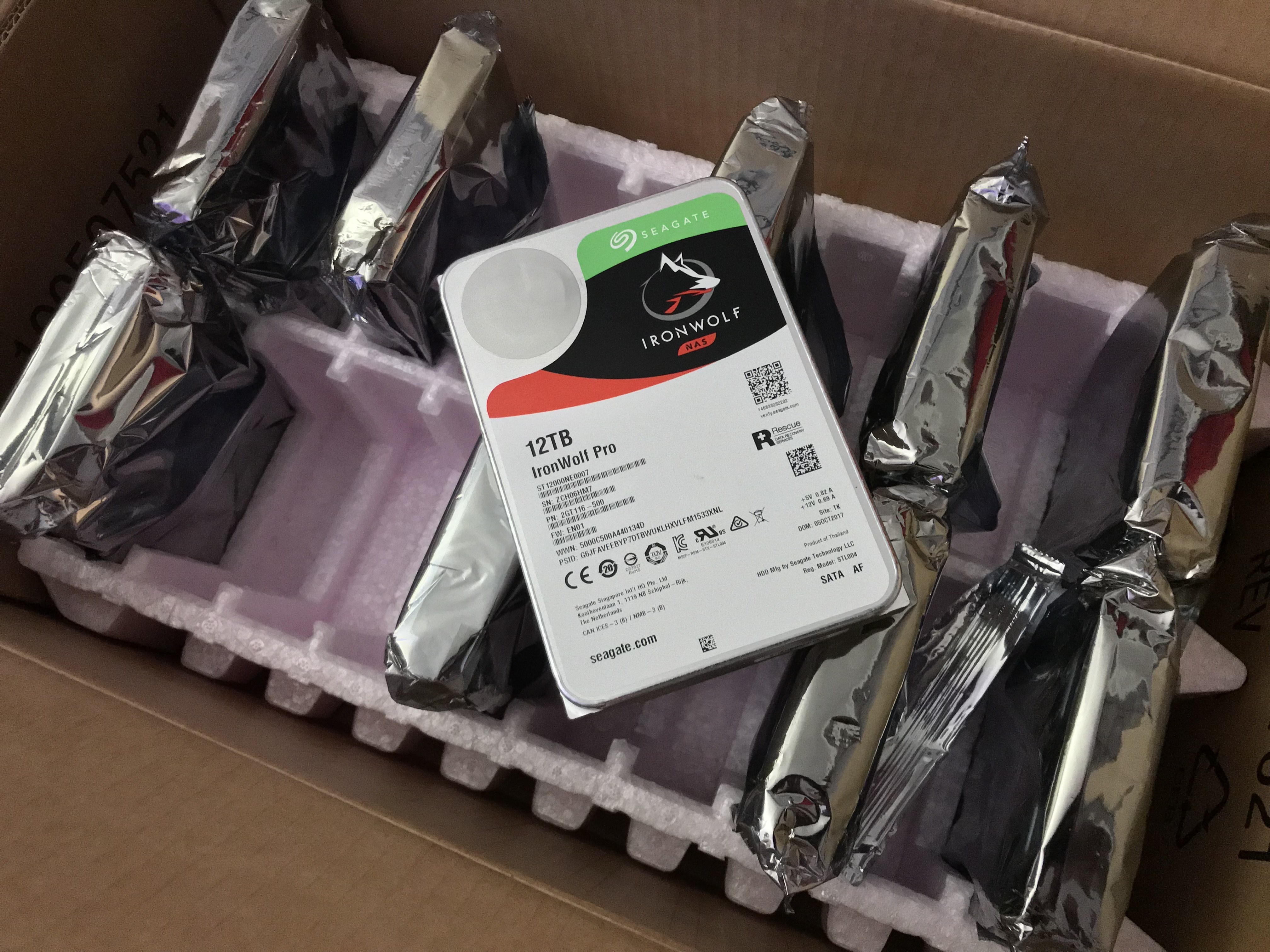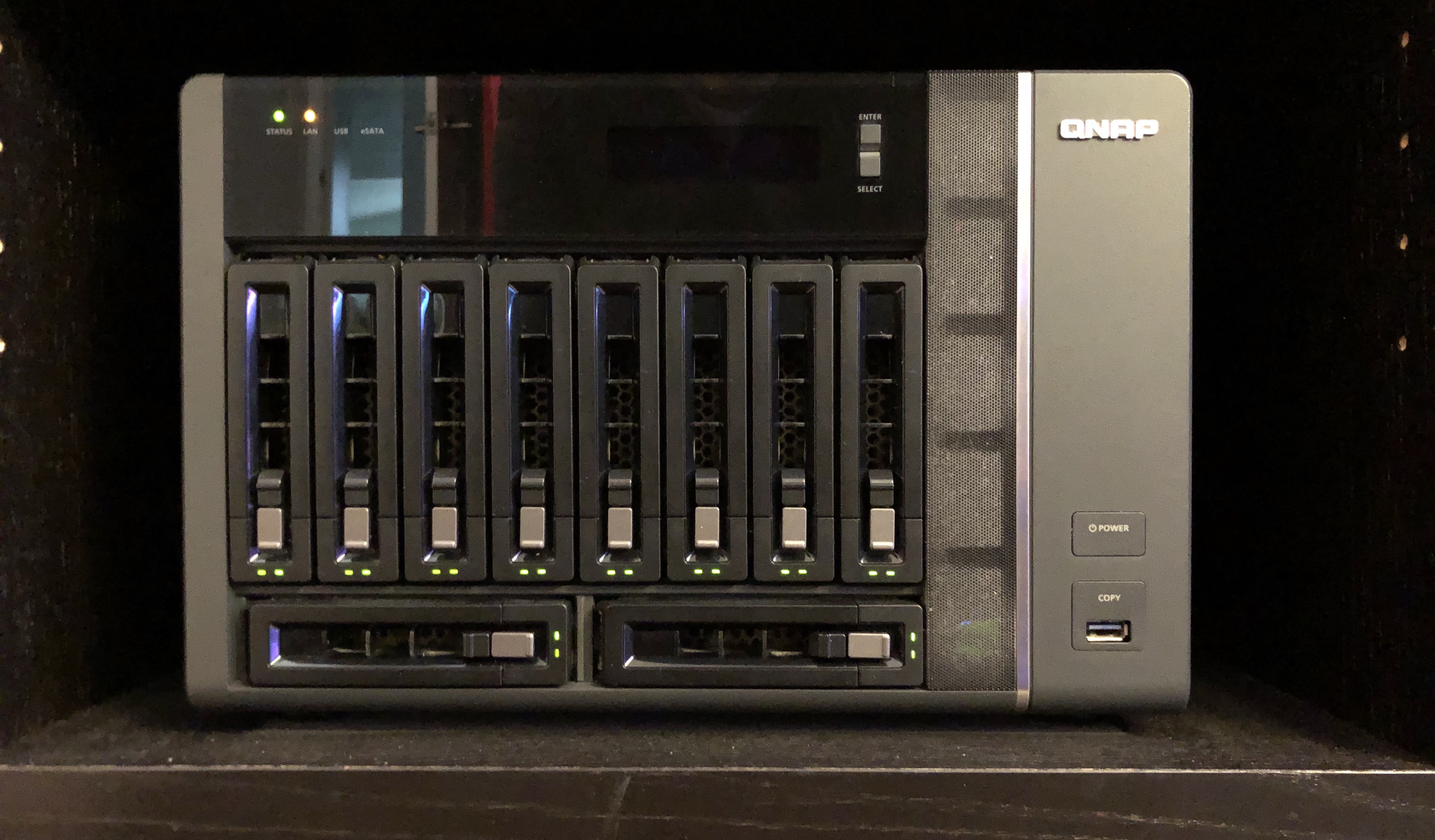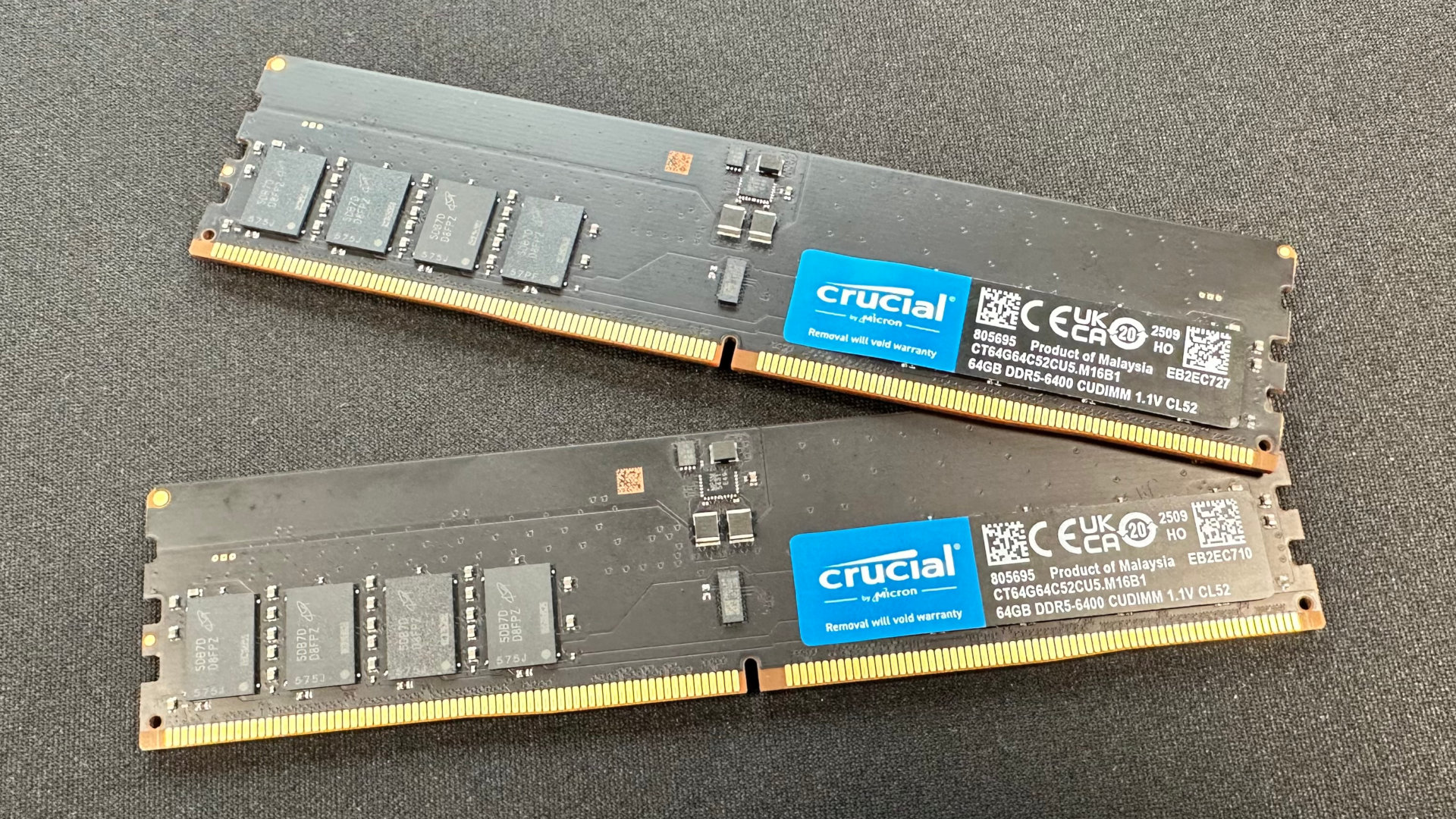My 120TB NAS is faster than an SSD
We take ten 12TB hard drives and see what they can do.

I remember a time when buying a 1GB hard drive set me back a mind-melting $300. That was a lot of money, and a lot of storage. My first PC had a 20MB hard drive, so when a "gigabyte" hit the market, it was substantial. Today we have cheap USB thumb drives that have hundreds of gigabytes in capacity.
When Seagate sent a heavy box to my house, I was pretty excited. In it, I knew there would be ludicrous amounts of storage—too much for the average mortal. In the box, Seagate included not just one, or two, but ten of its largest hard drives: 12TB IronWolf Pro drives.
Seagate's IronWolf series of drives are meant for NAS use, as in, they're meant to be used 24 hours a day, 7 days a week without failing. The IronWolf series doesn't sport the burst speeds that Seagate's Barracuda series of drives do, but they're close. The main difference between the Barracuda and IronWolf is that the former is meant for desktop use. But to go one step higher, Seagate sent over IronWolf Pros, which have a 5-year warranty attached to them. For drives with sizes such as these, you'll want maximum warranty.

The IronWolf Pro's main attraction for me is that it puts out equivalent performance to any desktop-oriented hard drive, while maintaining a focus on high levels of reliability. The drives essentially look like any other hard drive, but the secret sauce lies beneath.
Capacity: 12TB
Interface: SATA 6Gb/s
Cache: 256MB
Spindle speed: 7200 RPM
Average latency: 4.16ms
MTBF: 1.2 million
Load/Unload cycles: 600,000
Power average: 8.1W
Power idle: 7.1W
Power sleep: 0.6W
Warranty: 5 years
Special features: rotational vibration sensors, multi-user technology, up to 16 drives in RAID
Seagate takes advantage of rotational vibration sensors to maintain the IronWolf Pro's reliability. This makes the drive perfect for use in a RAID scenario, and in a RAID they'll be used.
But first, the question that always comes up is, "What do you need all that space for?" It really depends on what your PC use is like. On the desktop side, having more storage capacity simply allows you to store more things and not have to think twice about what you're saving or downloading. Games take up huge amounts of space these days, sometimes as 100GB or more, and aside from bandwidth caps, if you're a Steam hound, you'll use up hard drive space quickly. Going for SSDs above 1TB capacities can skyrocket costs, so hard drives are still the more economical way to add lots of space.
The second question that always comes up is, "12TB is a lot to lose if the drive dies!" Yes, it is. This is why I backup my data. Always backup your data, no matter what your setup looks like. I run multiple RAID 6 NAS units at home, backed up by business grade uninterruptible power supplies, but I still backup my data through multiple vectors. For example, my system is constantly being backed up using Backblaze, and large archival backup is sent to Amazon Cloud—I have an unlimited Amazon Cloud account so this is fine.
Keep up to date with the most important stories and the best deals, as picked by the PC Gamer team.
Testing these drives
Seagate rates the IronWolf Pro 12TB at a sustained throughput of 250MB/s. This is basically as fast as it gets for a drive in this class—and hard drives in general. To test ten of these drives, we're going to need a special kind of setup.
In a RAID setup, you're going to need your NAS to use either iSCSI or CIFS to take full advantage of the drives. This essentially lets you mount the NAS as an actual block-level drive to your PC, over the network. The mounted network drive will behave just like an internal hard drive would. Yanking the network cable then, is ill advised.

For testing, I used a QNAP TVS-EC1080 10-bay NAS enclosure that sports a beefy Intel Xeon E3-1246 v3 CPU running at 3.5GHz and 32GB of RAM. This is enough to thrash around any hard drive.
The network we use is also important. You're going to need 10Gbit Ethernet. With 10 drives in use, you're going to need to bind two 10Gbit Ethernet ports together for maximum throughput. Your motherboard's paltry 1 gigabit Ethernet port just won't cut it—although you can use it this way if you're just transferring data and you don't care about how long it takes or if you don't have other users like in an office environment.
Connected up the IronWolf Pro drives dished out some impressive numbers:
- 2120MB/s reads through the network, iSCSI, 16 threads
- 2216MB/s writes through the network, iSCSI, 16 threads
At these speeds, I'm basically maxing out dual 10Gbit fiber connections (there's always a bit of overhead, so you won't hit the theoretical maximum of 2,500MB/s). Unfortunately, latency plays a role here when you're hitting storage over a network:
- 381.77ms reads through the network, iSCSI, 16 threads
- 410.22ms writes through the network, iSCSI, 16 threads
The reason I'm testing with 16 threads is to basically pound the drives as hard as I can through the network. But as you can see, at these speeds, you can have a NAS that is basically as fast as an NVMe SSD in terms of throughput. Due to the latency though, running intense I/O applications is still not going to be as fast as an internally installed drive. Random I/O operations in particular are still going to favor SSDs, but not every application needs to do a lot of random I/O.
For kicks, I installed GTA5 on our iSCSI drive and used it to load the game. My load times:
Single IronWolf Pro internally installed: 34 seconds
Single Samsung 840 Pro 1TB SSD: 27 seconds
10Gbit NAS using iSCSI: 24 seconds
Now I can finally install games and run them off my NAS.
This was an interesting exercise, but most gamers won't be running games off a high-performance NAS. If you've got a sizable NVMe drive, it's still faster to install games and run them off that, but after the game is loaded, there's nearly no difference for most games.
Despite this, the Seagate IronWolf Pro drives performed exceptionally well, able to take some punishing workloads and then some. I like that the drives are backed by an industry-leading 5-year warranty, but mostly, I like their capacity. Just don't forget to do regular backups.


